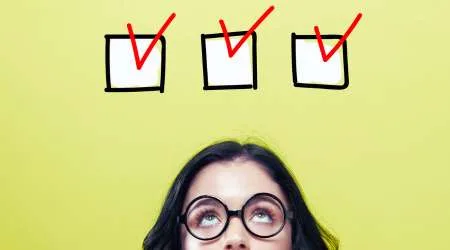
Key takeaways
- If you work or if you earn any sort of income through investments, you're required to lodge a tax return with the Australian Tax Office (ATO) each year.
- The financial year runs from July 1 through to June 30. Your tax return needs to be lodged by 31 October 2024 (or May 2025 if you have an accountant).
- Several big tax changes came into effect from 1 July 2024, most of which will benefit the average person.
Now: what is a tax return?
If you've earned any money in Australia throughout the financial year (1 July to 30 June) you need to declare this at tax time. If you've paid too much tax throughout the year you'll get some back in the form of a return. If you've underpaid, you'll owe some tax.
Your tax return is also a chance to declare work-related expenses as deductions, to boost your return.
If you're after a bit of help with your tax return, an Australian tax agent can help you correctly lodge your tax return.

"In the second year of doing my tax return as a non-permanent resident I realised that I could claim the taxes I had paid in the year for Medicare as I am not eligible for it. Once my accountant told me this, all I had to do was fill a form which was submitted with my tax return. I was even able to submit one for my first year when I didn't claim it. Depending on how much you are earning it can be upwards of $2000!"
All the changes from 1 July, 2024
These are not just related to your income tax – we're also sharing changes that could change your income:
Stage 3 tax cuts: The Australian government has announced changes to the proposed stage 3 cuts, planned to come into effect from July 1 this year.
- The lowest tax rate (for people earning $45,000 or less) will fall from 19% to 16%.
- The 32.5% tax rate will fall to 30% as previously planned, but will now cut off at $135,000.
- Anyone earning over $135,000 will be taxed at 37% (this bracket currently starts at $120,000).
- The top tax bracket of 45% will now kick in at $190,000 (instead of $200,000).
Minimum wage: Australia's minimum wage and award wages will increase by 3.75% from July 1, according to the Fair Work Commission.
- The decision will see the national minimum wage increase from $23.23 per hour to $24.10 per hour.
- This equals $882.80 per week to $915.91 per week, based on a full-time, 38-hour working week.
Paid Parental Leave: The government's Paid Parental Leave is changing. Right now, eligible parents can access up to 100 days of paid leave, or 20 weeks based on a 5 day work week.
- From 1 July 2024, you'll be eligible for 110 days, or 22 weeks based on a 5 day work week. This increases to 120 days (24 weeks) in July 2025, and 130 days (26 weeks) in July 2026.
- The rate of paid parental leave will increase in line with minimum wage to $915.91 per week.
Superannuation: The Super Guarantee is increasing to 11.5% on 1 July. It will then increase by a further 0.5% on 1 July 2025 to 12%.
- The before-tax contribution cap in 2024-25 is $30,000, which is up from $27,500 in 2023-24.
- The after-tax contribution cap in 2024-25 is $120,000, which is up from $110,000 in 2023-24.
Finder survey: How many Australians think they pay too much tax?
| Response | |
|---|---|
| Yes | 63.75% |
| No | 36.25% |
How to lodge your tax return
- Step 1. Decide which way to lodge - online yourself or with a tax agent. Online through the ATO is free and simple; you just need records of your deductible expenses. If you use a tax agent they can manage the process for you and help you claim for items you may not have realised you could claim.
- Step 2. Either way: You'll need to gather the info and documents you need to support your claims. Receipts, invoices, bank statements: these will all help you verify your claims, if you ever get audited.
- Step 3. Set aside a couple of hours to lodge your tax return via the ATO's online portal, inside MyGov. Often, information like your income and any bank interest you've earned is already listed, if you give your MyGov account permission to collect data from your employer and the bank. If you don't want to dive into it yourself, you can hand all your docs over to your tax agent to do it for you.
- Step 4. Lodge your return with the ATO. The earliest you can do this is around mid-July, as the government gives banks and employers a couple of weeks to get all of their information filed and up to date before you lodge.
ATO Tax return deadlines
If you're doing your tax return yourself online, you have until 31 October 2024 to submit your tax return.
If you're using a registered tax professional you have until mid-May 2025.
Make sure you lodge you tax return ahead of the deadline set by the ATO each financial year, or you risk getting a penalty.
Should you do your tax return yourself, or get professional support?
You can complete your tax return yourself online for free using the ATO's tool myTax, or you can seek support from a registered tax agent.
An accountant or tax agent can help you maximise your deductions and is especially useful if you have a complex tax situation (multiple income streams or investments, you run a business etc).
More helpful tax guides
- The pros and cons of tax agents and DIY
- Choosing the right tax agent
- How to maximise your tax deductions

"Most people earning an income in Australia will need to lodge a tax return, and while this comes with some administration work, it also comes with an opportunity. When you use the rules to your advantage, you'll keep more of your hard-earned income and get ahead faster. Like anything worthwhile, tax planning is a skill set you build over time, and building your knowledge is the first step. "

"When deciding if you need to lodge a tax return, it's important to consider whether you have capital gains or foreign income. Even if your taxable income is below the tax-free threshold, you must still lodge a return if you've realised any capital gains (such as from selling shares, cryptocurrency, or property) or received foreign income. This is crucial because the ATO requires you to report these types of income, and their reporting capabilities are continuously improving. Failing to declare can result in significant fines and penalties"
DISCLAIMER: Many of the comments in this article are general in nature and anyone intending to apply the information to practical circumstances should seek professional advice to independently verify their interpretation and the information applicability to their own particular circumstances.
Sources
Ask a question
18 Responses
Read more on Tax Returns
-
Online tax return via myGov vs using a tax agent
Lodging your tax return yourself online via myGov is free, but a professional tax agent can help you maximise your refund and save you time.
-
Tax and the gig economy: What you need to know
Mark Chapman goes through the tax requirements you need to know about if you're an Uber driver, Airbnb host or do other work in the gig economy.
-
Tax deductions: What can I claim on tax?
Here's what you can and can't claim in your tax return. See our checklist here and know what receipts you need to keep.
-
Tax return deadline: When is my tax return due?
Your tax return has a different deadline depending on which financial year you're filing for, and whether or not you're using a tax agent. See which tax return due date applies to you in this guide.
-
How to save money on tax in Australia
How does income tax work, and how can you save money on your next tax return? Find out in this handy guide.
-
Do you pay tax on savings account interest in Australia?
If you earn interest from a savings account, you need to pay tax on that interest at the same rate as the rest of your annual taxable income.
-
Cheap tax agents and tax accountants
Compare cheap tax agents and accountants that can help you lodge your tax return, claim more deductions and get you more tax back.
-
Tax and record keeping – how many years of receipts should I keep?
What records do you need to keep when it comes to your tax return and how long for?
-
Tax tips: How to get more tax return
We’ve put together a list of our best tips for boosting this year’s tax return. Maximise your tax refund today.
-
Income tax calculator
Use our tax calculator to estimate how much tax you'll likely pay this financial year, and how much tax you could get back in your tax return.



Hi
how can I find a Tax agent through your website ? Let’s say Fin tax Group. It does not let me the option of choosing the agent
Hi,
You can use our site to compare some different tax agents and when you’ve found one you’d like more information on you can visit their site directly. We don’t currently link directly to their sites.
Thanks,
Alison
I have a friend who has just sold their family home in China. They will move here permanently soon. What is the best way to transfer the sale money to Australia? Is it taxable? If they send in multiple amounts less than $10,000 is that OK?
Thank you.
Hi Philly,
Thank you for getting in touch with Finder.
According to our review on tax implications on large money transfers, if someone is planning to send a large sum of money to you in Australia, you could be on the hook for taxes regulated by the Australian Taxation Office (ATO), depending on the reason why they are sending it to you.
You may also refer to our guide on how your friend from China can open a bank account in Australia.
I hope this helps.
Please feel free to reach out to us if you have any other enquiries.
Thank you and have a wonderful day!
Cheers,
Jeni
My previous employer sold the business I work for early this year, he never sent me a group certificate and I cant phone him to get one sent. How do I lodge with out that group certificate? Any help would be appreciated.
Hello Sharon,
Thank you for your inquiry.
You may consider checking the pre-filing service in myTax if your employer is unable to give you a group certificate. There are ways on how to get it without your employer, usually a statutory declaration is no longer required.
Alternatively, you can review ATO page regarding details about obtaining payment summary information, which includes a gross pay estimator to help you reconstruct.
Hope this helps.
Cheers,
Jonathan
Last year [2015-16] I downloaded an ATO app. Filled it out with my Income/Expenses (tax relevant) and then lodged it online. Question – Can I do the same this year?
Hi Denis,
Yes, you can lodge your tax return the same way. Please make sure to lodge your tax return by the 31 October deadline to avoid penalties. If you are completing your own tax return and are unable to lodge by 31 October, kindly contact ATO as soon as possible.
Cheers,
Liezl
Is it possible to do my return now.I haven’t earnt any money this financial year. My only income has been centrelinks newstart .I am owed $2146 from tax i paid from a super claim.as my circumstances will not change and it was only one day that stopped me claiming last year .I wonder if i could do it now as I’m in a desperate situation.i have a car which doesn’t go and am going to living in it unless I can find a way to pay overdue rent.I have serious back issues that will get worse if this happens .thank for you time.Christine
Hi Christine,
Thank you for your inquiry.
If you want to find out if you can lodge a return for 2015-16, you’d need to read ATO’s lodge a tax return guide. If you can lodge, then there are instructions from the Department of Human Services that you can follow on how you can lodge your tax return.
Hope this helps.
Cheers,
May